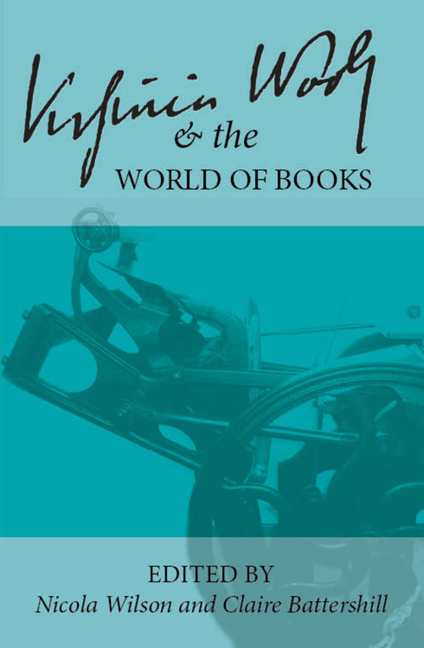 Virginia Woolf and the World of Books
Virginia Woolf and the World of Books Book contents
- Frontmatter
- Contents
- Introduction
- List of Abbreviations
- Keynote
- In the Archives
- Craftsmanship
- The Hogarth Press
- “obscure, indecent and brilliant”: Female sexuality, the Hogarth Press, and Hope Mirrlees
- After the Deluge, The Waves
- Alternative Histories: Hogarth Press's World-Makers and World-Shakers Series
- The Hogarth Press, a Singular Art Gallery
- Hours in A Library
- The Art of the Book
- The Art of the Narrative
- Making New Books: Creative Approaches
- The Book in the World: Woolf's Global Reception
- Editing and Teaching Woolf
- Intertextuality
- Lives in Writing
- Notes on Contributors
The Hogarth Press, a Singular Art Gallery
from The Hogarth Press
- Frontmatter
- Contents
- Introduction
- List of Abbreviations
- Keynote
- In the Archives
- Craftsmanship
- The Hogarth Press
- “obscure, indecent and brilliant”: Female sexuality, the Hogarth Press, and Hope Mirrlees
- After the Deluge, The Waves
- Alternative Histories: Hogarth Press's World-Makers and World-Shakers Series
- The Hogarth Press, a Singular Art Gallery
- Hours in A Library
- The Art of the Book
- The Art of the Narrative
- Making New Books: Creative Approaches
- The Book in the World: Woolf's Global Reception
- Editing and Teaching Woolf
- Intertextuality
- Lives in Writing
- Notes on Contributors
Summary
Virginia Woolf has an ambiguous relationship with painting, as Diane Gillespie revealed in The Sister's Arts. At times she seems to be jealous of the painter; at others, words are the superior art form. Sometimes there is equality between plume and paintbrush. She was used to comparisons of the merits of each discipline, as she noted in her diary: “Roger [Fry] compared the poetry with the painting. I like it all very much” (D1 80). Word may be king, the brush too. Later, Virginia regards painting with an envious eye: “How I wish I were a painter” (L6 236). Why? Because “Words are an impure medium” (Walter Sickert 13), as she tells Ethel Smyth: “one's sentences are only an approximation, a net one flings over some sea pearl which may vanish; and if one brings it up it wont be anything like what it was when I saw it, under the sea” (L4 223). Because words are inappropriate: “But words, words! How inadequate you are!” (E3 166). Because language is a prison—“[words] are so stored with meanings” (CE2 248)—and words can't all signify. Virginia doesn't append any word to her sister's name when she dedicates Night and Day to her: “To Vanessa Bell but, looking for a phrase, I found non to stand beside your name” (ND). The painter has authentic eyesight—“the writer has need of a third eye” (E4 244)—and painting slips out of routine: “As a painter, I believe you are much less conscious of the drone of daily life than I am, as a writer” (L1 475). Painting can be less trying than literature—“They are very large in effect, these painters; very little self-conscious; they have smooth broad spaces in their minds where I am all prickles & promontories” (D1 69)—and it gets ahead of literature: “Literature was suffering from a plethora of old clothes. Cézanne and Picasso had shown the way” (RF 172).
Despite all of these drawbacks, word can be king. It has more ability than the brush: “Surely you must see the infinite superiority of the language to the paint? Think how many things are impossible in paint” (L3 493).
- Type
- Chapter
- Information
- Virginia Woolf and the World of BooksSelected Papers from the Twenty-seventh Annual International Conference on Virginia Woolf, pp. 93 - 100Publisher: Liverpool University PressPrint publication year: 2018


